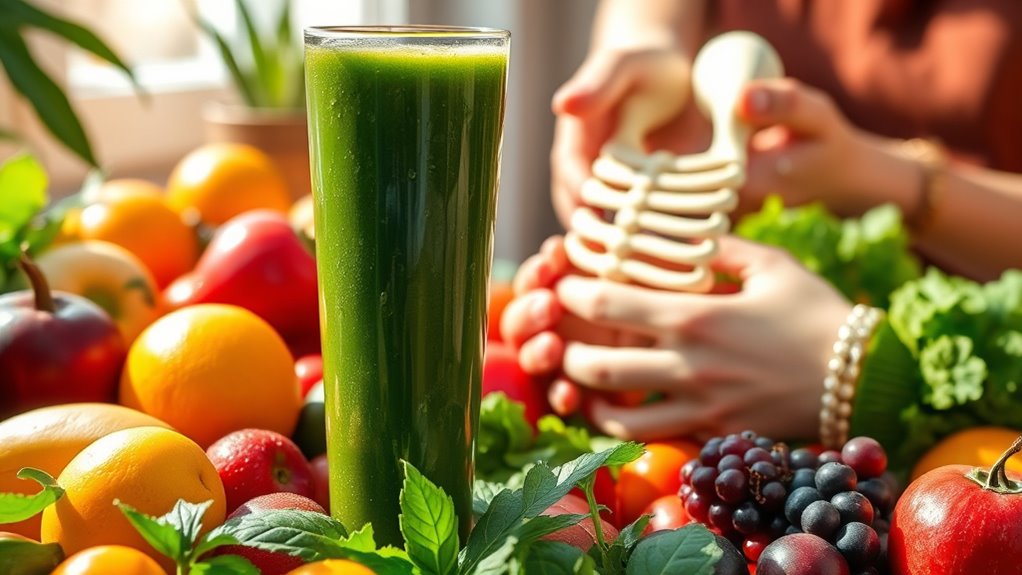Juicing can dramatically boost your bone strength by concentrating essential nutrients like calcium and collagen. These nutrients are vital for bone density and overall health. Calcium-rich juices, like fortified orange juice and kale juice, provide significant support for your bones, while collagen helps maintain their structure as you age. Plus, the juicing process enhances vitamin absorption, making it easier for your body to benefit. Want to know which specific juices pack the most punch for bone health?
Key Takeaways
- Juicing concentrates essential nutrients like calcium and vitamin C, crucial for enhancing bone strength and collagen production.
- Cold-pressed juices preserve nutrients, providing a powerful boost to support bone health and density.
- Calcium-rich juices, such as fortified orange and kale juice, contribute significantly to daily calcium intake, especially for those over 50.
- Juicing complements a balanced diet by adding nutrient density, while whole fruits provide necessary fiber for digestive health.
- Incorporating juices with weight-bearing exercises and adequate vitamin D intake maximizes their benefits for bone strength and overall health.
The Role of Calcium in Bone Health
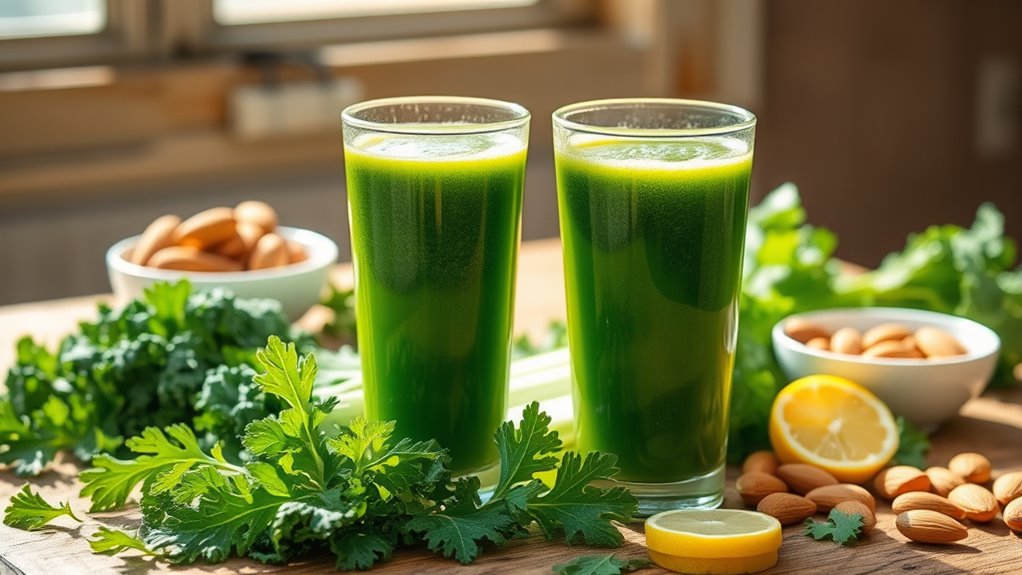
Calcium is the cornerstone of strong bones, making it essential for maintaining your bone health. Approximately 99% of the body’s calcium resides in your bones, critical for preserving bone mass and density.
If you don’t get enough calcium, your bones can become weak and brittle, increasing your risk of fractures and osteoporosis, especially as you age. Women face a higher risk of osteoporosis after menopause due to lower calcium levels, so it’s important to guarantee adequate intake throughout your life.
The National Institutes of Health recommends 1,000 mg of calcium daily for adults, rising to 1,200 mg for women over 50. Pairing calcium-rich foods with vitamin D enhances absorption, maximizing your bone health and strength.
Nutrient-Rich Ingredients for Juicing

To maintain strong bones, incorporating nutrient-rich ingredients into your juicing routine can make a significant difference.
Start with calcium-rich options like fortified orange juice, almond milk, and spinach juice to provide essential nutrients needed for bone health.
Don’t forget leafy greens like kale and broccoli, which aren’t only high in calcium but also packed with vitamin K, vital for bone metabolism.
Adding fruits rich in vitamin C, such as kiwis, oranges, and strawberries, supports collagen production, enhancing bone strength.
Include magnesium-rich ingredients like avocados and bananas to improve calcium absorption.
Finally, consider antioxidant-rich fruits like cranberries, which can help reduce inflammation and lower the risk of bone breakdown, further benefiting your overall bone health. Additionally, incorporating vegetable juices like celery can provide low-carb options for those monitoring their diet while still supporting bone health.
Benefits of Collagen for Bone Density
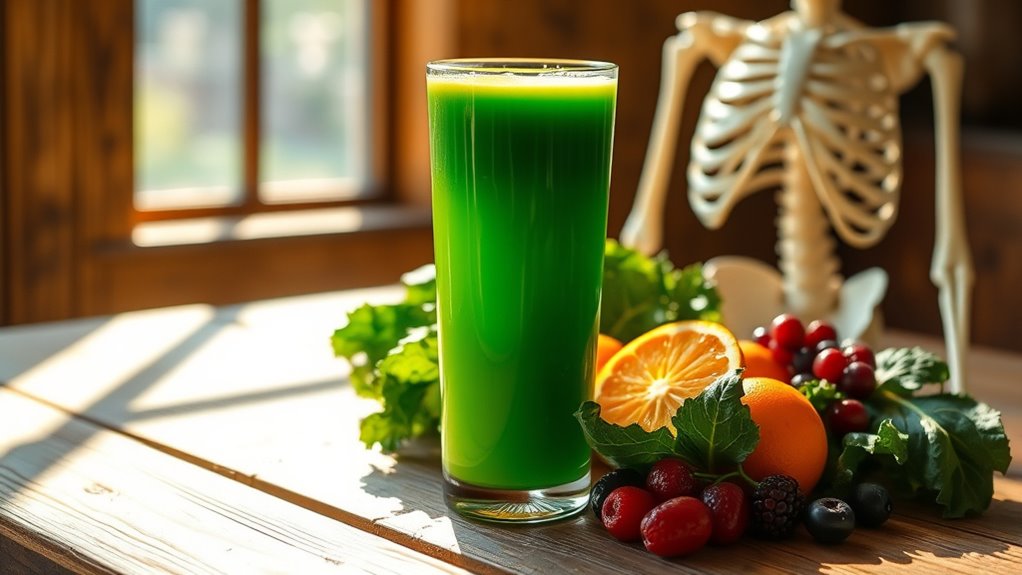
Collagen is essential for your bones, providing the structure and strength they need to maintain density.
As you age, your body produces less collagen, increasing the risk of osteoporosis and fractures.
Incorporating collagen-rich foods or supplements into your diet can greatly boost your bone health and help prevent age-related bone loss. Additionally, consuming green juice may enhance overall nutrient absorption, further supporting bone density.
Collagen’s Role in Bones
Strong bones rely heavily on collagen, which makes up about 90% of their organic matrix. This fundamental protein not only provides structure but also enhances bone density, especially in postmenopausal women at risk for osteoporosis.
By stimulating the production of osteoblasts, collagen peptides promote healthier bone remodeling. To maximize these benefits, it’s important to pair collagen with other essential nutrients like calcium and vitamin D.
Don’t forget the role of vitamin C; it’s crucial for collagen synthesis. Incorporating vitamin C-rich foods or juices into your diet can further support your bone health.
Together, these nutrients create a powerful combination that can improve overall bone health and reduce the risk of fractures, ensuring your bones stay strong and resilient.
Sources of Collagen
While you might not realize it, the sources of collagen in your diet play an important role in maintaining bone density. Collagen is critical for bone health, providing structure and flexibility. To boost your collagen intake, consider incorporating collagen-rich foods and vitamin C sources into your meals. Vitamin C is essential for collagen production, working alongside amino acids found in foods like bone broth and certain fish. Additionally, consuming juices rich in vitamins can further enhance collagen synthesis and overall bone health.
| Food Source | Benefits |
|---|---|
| Bone Broth | Rich in collagen |
| Salmon | High in omega-3s, collagen |
| Citrus Fruits | Boosts vitamin C |
| Berries | Supports collagen synthesis |
| Leafy Greens | Nutrient-dense for bones |
Including these foods can enhance your collagen levels and support your bone density effectively.
Collagen Supplementation Benefits
If you’re looking to boost your bone density, collagen supplementation can be a game-changer.
Collagen provides essential amino acids that support the formation of the bone matrix, enhancing bone strength. Studies show that collagen peptides stimulate osteoblast activity, which is essential for bone formation and helps reduce the risk of osteoporosis and fractures.
Additionally, collagen may improve calcium absorption in your bones, working synergistically with nutrients like vitamin D and magnesium. Research indicates that daily collagen intake can considerably increase bone mineral density, especially in postmenopausal women at higher risk for bone loss.
Since collagen is a critical component of bone structure, it also helps reduce inflammation and pain, further supporting your overall bone health. Moreover, incorporating solar energy solutions into your lifestyle can promote overall well-being, including supporting a healthy environment for your bones.
How Juicing Concentrates Nutrients
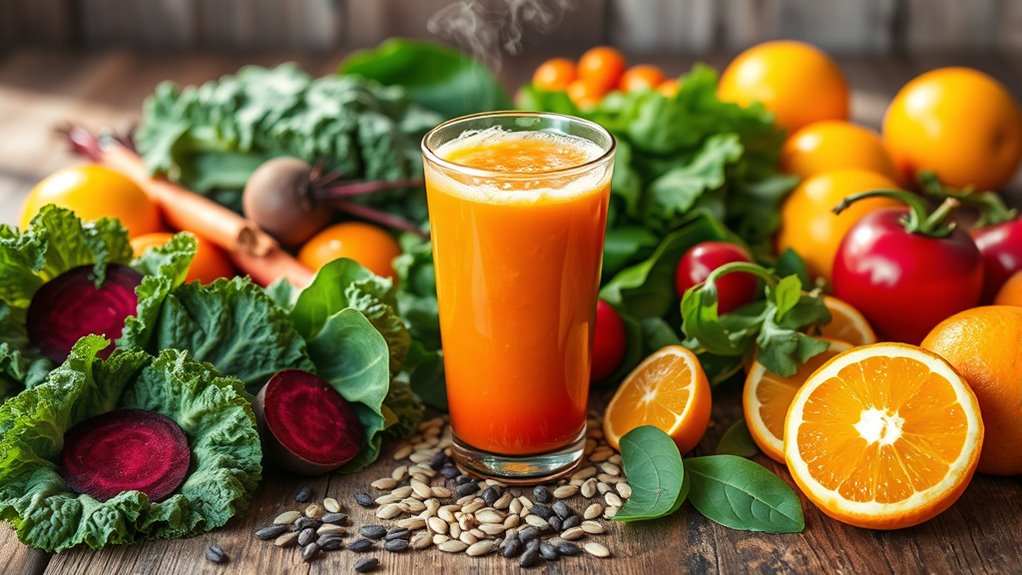
When you juice fruits and vegetables, you concentrate their nutrients, giving you a powerful boost of vitamins and minerals in every sip.
Techniques like cold-pressing help preserve these essential nutrients, making your juices even more beneficial for bone health.
Freshly made juices are best consumed right away, ensuring you get the maximum nutrient absorption without the risk of contaminants.
Nutrient Preservation Techniques
Juicing offers a powerful way to concentrate nutrients from fruits and vegetables, making it easier for you to boost your intake of essential vitamins and minerals.
By using cold-press juicing techniques, you can enhance nutrient retention, preserving crucial components that may be lost in traditional methods. This process delivers higher nutrient density per serving, especially when you incorporate leafy greens like spinach and kale, which are rich in calcium for improved bone strength.
Remember, consuming freshly made juices immediately maximizes nutrient retention and reduces the risk of bacterial growth.
While whole fruits and vegetables provide fiber, juicing can considerably amplify your calcium intake and other essential nutrients, supporting your overall health and well-being. Additionally, incorporating juices made from celery juice powder can provide essential nutrients like potassium, further benefiting bone health.
Juicing vs. Whole Fruits
While whole fruits are packed with fiber and essential nutrients, juicing can offer a concentrated source of vitamins and minerals that support bone health. By removing insoluble fiber, juicing enhances the absorption of important nutrients like calcium and vitamin C.
Cold-press juicing methods are particularly beneficial, preserving more vitamins compared to traditional methods. Juiced fruits, such as oranges and spinach, provide a quick nutrient boost, especially for those who struggle to eat enough fruits and vegetables. Additionally, freshly squeezed juice retains more nutrients than processed juice, making it a superior option for those looking to enhance their nutrient intake.
However, it’s important to remember that while juicing can complement your diet, it shouldn’t replace whole fruits. Whole fruits still deliver dietary fiber, essential for digestion and overall wellness, ensuring that you maintain a balanced approach to nutrition for peak bone health.
Benefits of Fresh Juices
Fresh juices offer a powerful way to boost your nutrient intake, especially when you choose cold-pressed varieties. This method concentrates essential nutrients, making it easier for your body to absorb what it needs for ideal bone health.
Here are some key benefits of fresh juices:
- High Calcium Content: Juices from dark leafy greens like spinach and kale pack a calcium punch.
- Vitamin D Boost: Fortified juices, such as orange juice, enhance your vitamin D intake, vital for calcium absorption.
- Quick Nutrient Absorption: Juicing removes insoluble fiber, allowing faster digestion and nutrient uptake.
- Variety of Nutrients: You can mix various fruits and vegetables for a diverse nutrient profile that supports your bone health effectively.
Incorporating fresh juices into your diet can greatly enhance your calcium and vitamin D levels.
Recommended Juices for Bone Strength
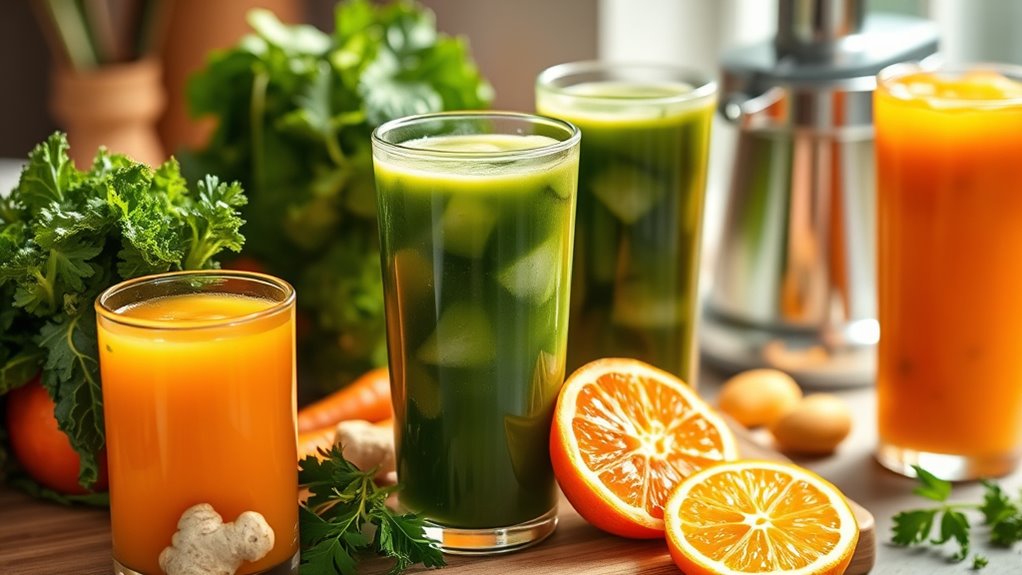
When you’re looking to boost your bone strength, incorporating specific juices into your diet can make a significant difference.
Start with fortified orange juice, which can provide up to 350 mg of calcium per glass—an excellent option for strong and healthy bones.
Fortified orange juice offers up to 350 mg of calcium per glass, making it a fantastic choice for strong bones.
Kale juice is another fantastic choice, offering over 100 mg of calcium and high levels of vitamin K.
Spinach juice serves as a concentrated source of calcium and magnesium, aiding calcium absorption in your body.
Don’t forget almond milk juice, often fortified with calcium and vitamin D, delivering healthy fats that support bone density.
Finally, carrot juice brings calcium, potassium, and antioxidants, contributing to your overall bone health.
Enjoy these juices for bone strength!
Juicing vs. Whole Fruits: What You Need to Know
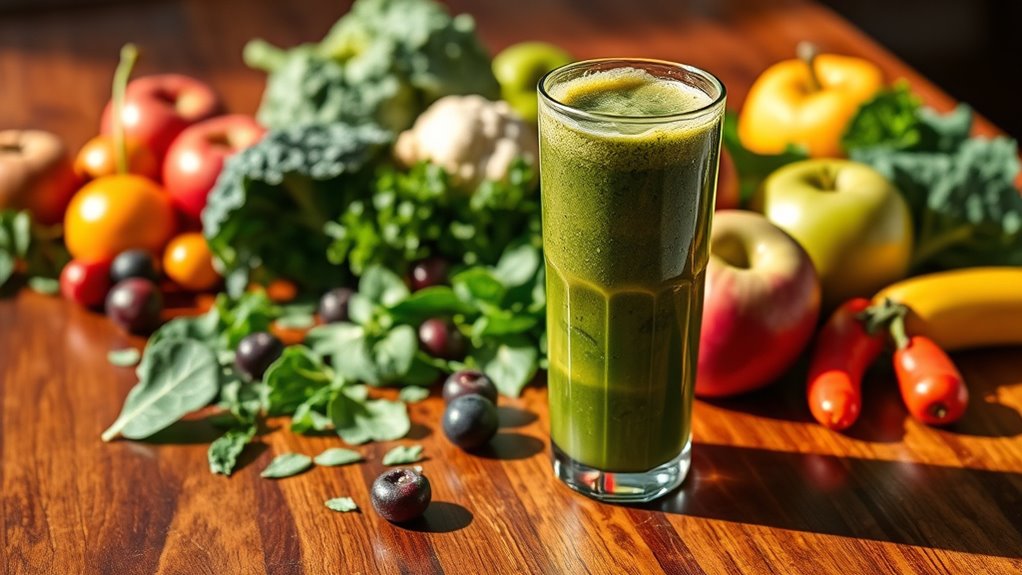
Juicing can be an appealing way to increase your intake of fruits and vegetables, but it’s important to reflect on how it stacks up against eating whole produce.
Here are four key points to bear in mind:
- Fiber Loss: Juicing removes much of the fiber found in whole fruits, which is essential for digestive health and helps you feel full.
- Nutrient Absorption: Whole fruits provide a balanced source of nutrients, and absorption isn’t noticeably better from juices.
- Sugar Concentration: Juices often concentrate sugars without the beneficial fiber, which can affect your overall health.
- Blending Benefits: Blending retains more fiber and nutrients compared to juicing, making it a healthier option for bone strength and calcium intake. Additionally, consuming whole fruits can enhance your intake of essential vitamins like vitamins A, C, and K, which are crucial for overall health.
Choosing whole fruits over juicing can lead to better health outcomes.
Incorporating Juices Into a Balanced Diet
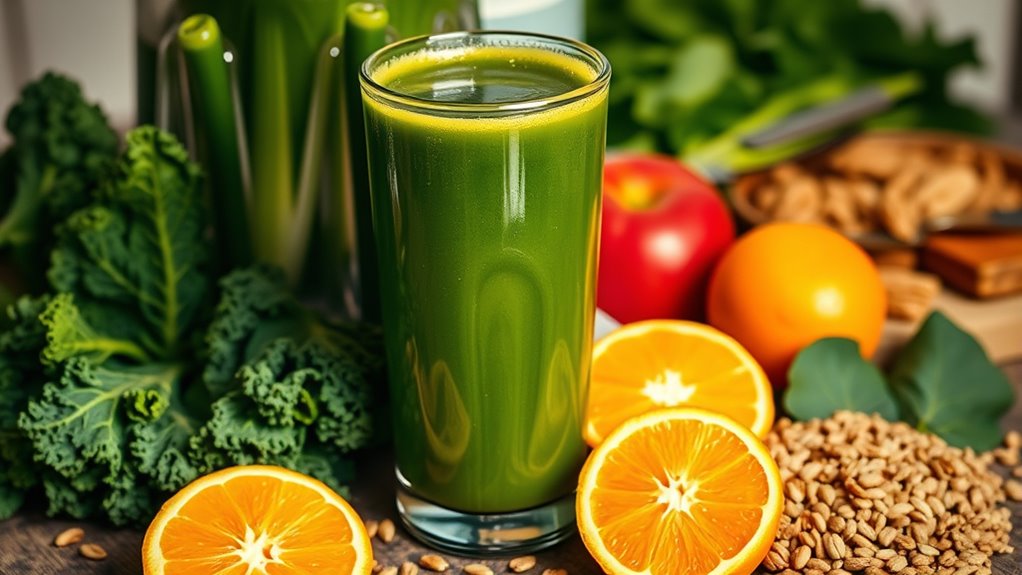
While whole fruits offer numerous health benefits, incorporating juices into a balanced diet can enhance your nutrient intake.
Calcium-rich juices, like fortified orange and spinach juice, boost your calcium levels, essential for maintaining bone mass, especially if you’re over 50. Aim for 1,200 mg of calcium daily.
Juicing also helps increase your vitamin C intake, which supports collagen production, important for bone strength. Blending fruits and vegetables retains more fiber, making it a balanced option while providing necessary nutrients for bone health.
Remember, juices should complement whole foods, not replace them, as whole foods offer additional fiber and lower sugar content.
Combine juicing with weight-bearing exercises and adequate vitamin D for best calcium absorption and bone health.
Frequently Asked Questions
Which Juice Makes Bones Stronger?
If you’re looking to strengthen your bones, consider juicing fortified orange juice, which packs a hefty dose of calcium.
Spinach juice is another great option, loaded with calcium and magnesium that helps your body absorb calcium better.
Kale juice offers vitamin K, crucial for bone health, while almond milk juice often comes fortified with calcium and vitamin D.
Don’t forget carrot juice, which contains calcium and other essential nutrients for bone resilience.
What Is the Fastest Way to Increase Bone Density?
To quickly increase bone density, start incorporating weight-bearing exercises like brisk walking or stair climbing into your routine.
Combine these with a diet rich in calcium and vitamin D, aiming for 1,000 mg of calcium daily and 800 IU of vitamin D.
You might also consider adding collagen supplements or bone broth for added support.
Don’t forget to get regular bone density tests to monitor your progress and adjust your plan as needed.
What Drink Is Good for Bone Repair?
Did you know that fortified orange juice can provide up to 350 mg of calcium per glass?
For bone repair, consider incorporating juices like fortified orange juice, spinach juice, or almond milk into your diet. Each offers essential nutrients that support bone health.
Spinach juice is rich in calcium and magnesium, while almond milk often contains added vitamin D. Together, these drinks can strengthen your bones and aid in recovery.
What Does Juicing Every Day Do to Your Body?
Juicing every day can boost your nutrient intake considerably. You’re likely to absorb essential vitamins and minerals more easily, which can improve your overall health.
By incorporating fruits and vegetables, you’ll enhance your hydration, energy levels, and potentially aid in digestion.
However, it’s important to balance your juices with whole foods to maintain fiber intake. This way, you’ll support both your digestive health and nutrient absorption for a well-rounded diet.
Conclusion
So, if you thought sipping on juice was just a trendy way to quench your thirst, think again! Who knew that tossing some leafy greens and fruits into a blender could turn you into a bone-strengthening superhero? Forget the gym; just juice it! While you’re at it, maybe throw in a sprinkle of fairy dust for good measure. But really, combining these nutrient-packed drinks with a balanced diet might just be the secret to bone strength—no magic required!
Cindy thoroughly researches juicing trends, techniques, and recipes to provide readers with practical advice and inspiration. Her writing style is accessible, engaging, and designed to make complex concepts easy to understand. Cindy’s dedication to promoting the advantages of juicing shines through her work, empowering readers to make positive changes in their lives through the simple act of juicing.

